Georgia House Considers Antisemitism Definition
A bill designating the International Holocaust Remembrance Alliance definition remains, for now, in a House committee.
Dave Schechter is a veteran journalist whose career includes writing and producing reports from Israel and elsewhere in the Middle East.
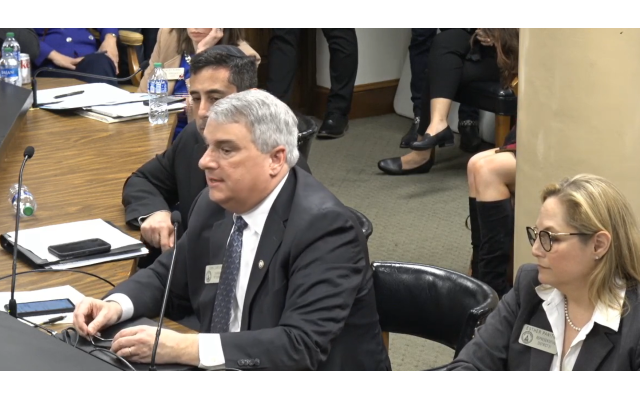
At the conclusion of a three-hour hearing that touched on legal and legislative fine points and featured impassioned testimony, the Georgia House Judiciary Committee decided Jan. 31 that it needed more time to consider how to define antisemitism in the state legal code.
Legislation designated as House Bill 30 would employ the International Holocaust Remembrance Alliance definition and “require state agencies and departments to consider such definition when determining whether an alleged act was motivated by discriminatory antisemitic intent.”
An almost identical bill was approved overwhelmingly by the House in 2022 but the legislative clock ran out before the Senate could act. The General Assembly works in two-year cycles, requiring that the measure be reintroduced in 2023.
The 38-word IHRA definition reads: “Antisemitism is a certain perception of Jews, which may be expressed as hatred toward Jews. Rhetorical and physical manifestations of antisemitism are directed toward Jewish or non-Jewish individuals and/or their property, toward Jewish community institutions and religious facilities.”
Key to the definition are 11 accompanying examples of what constitutes antisemitism. Those include accusing Jews outside of Israel of dual loyalty, comparing Israel to Nazis, calling Israel racist, “denying the Jewish people their right to self-determination,” and applying standards to Israel “not expected or demanded of any other democratic nation.”
Since being approved in May 2016 by the IHRA, the definition has been adopted by some 1,100 governments and non-governmental bodies worldwide, including 39 member nations of the United Nations and — by law, executive order, or resolution — more than two dozen U.S. states.
Testifying before the Georgia House committee, supporters of HB 30 cited the need for a legal definition at a time of increased anti-Jewish rhetoric and violence. Opponents warned that the proposed statute could be used to curtail free speech, specifically criticism of Israel, even though the bill states: “Nothing in this Code section shall be construed to diminish or infringe upon any right protected under the First Amendment to the United States Constitution or the Georgia Constitution.”
Interest in the legislation was sufficient to fill every chair in the hearing room, with some people standing along the walls or sitting on the floor.
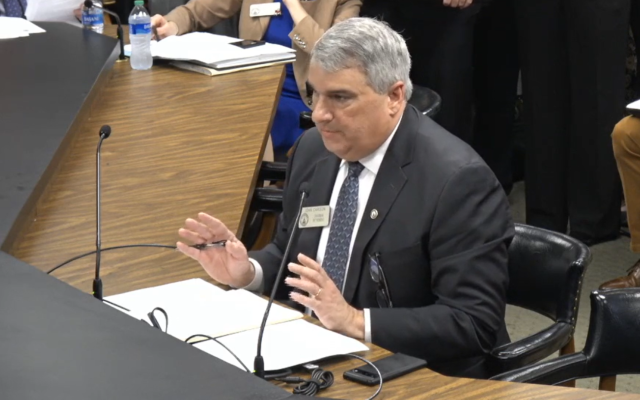
The chief sponsor of HB 30, Marietta Republican Rep. John Carson, told the committee, “This bill, all it does is create an objective, internationally recognized standard for what is and what is not antisemitism,” something “that prosecutors can use when prosecuting crimes specifically against the Jewish people.” Other sponsors include first-term Sandy Springs Democratic Rep. Esther Panitch, who is Jewish.
Attorney Mark Goldfeder, director of the National Jewish Advocacy Center, who also is general counsel for the Hillel chapters on Georgia college and university campuses, said: “There’s been a lot of misinformation about this bill. The bill does not criminalize anything…It does not have anything to do with protected free speech…It only addresses discriminatory acts and hate crimes committed against Jewish people.”
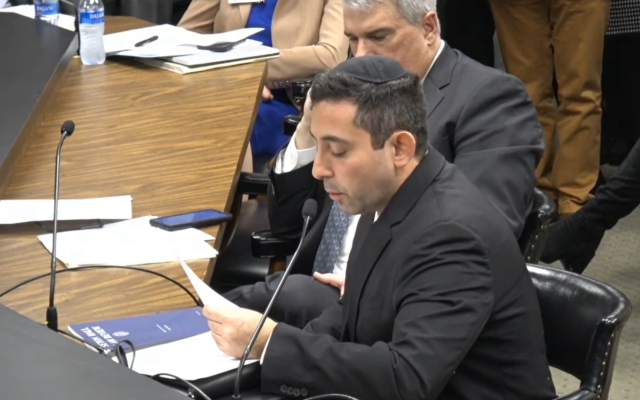
Goldfeder cited the case of Samantha Strelzer, president of the Rollins Student Government Association at the Rollins School of Public Health of Emory University, who said she was subjected to harassment and defamation after participating in a Birthright trip to Israel. “The bill is not about protecting Israel. It’s about protecting Jews. Many times, Jews are targeted because of a real or perceived connection to Israel,” he said.
Goldfeder also read aloud a letter written by “Aaron,” who said that the anti-Jewish abuse he, then 13 years old, and his brother endured for 18 months at a Fulton County public school, was “the lowest point in my life” and that he had contemplated suicide. Aaron and his family were present at the hearing, but he did not wish to speak. The letter recounted incidences of swastikas and other graffiti, Hitler salutes, and students throwing money at them.
According to the letter, school officials dismissed complaints by saying that they did not constitute antisemitism. Goldfeder said that a statutory definition is needed, so that school officials, as well as prosecutors handling hate crime cases, have a standard on which to rely. “I do not want this to happen to another kid,” Aaron wrote in the letter.
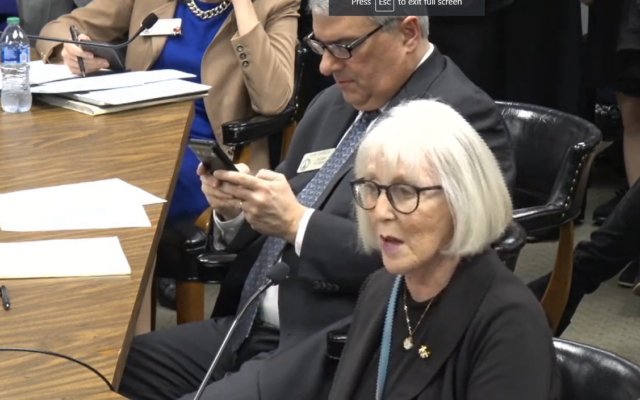
Simone Wilker, speaking as a member of Hadassah, the Women’s Zionist Organization of America, thanked legislators for passage of the 2020 hate crimes bill, which allows for enhanced sentencing if a bias threshold is met. “The only way you can do it is to define it first,” she said. “Without that definition in your hand it’s very hard for law enforcement or other federal or state officials to make that decision.”
Adding a personal note, Wilker told how her grandfather left Nazi Germany with other family members and found a new home in Savannah, Ga. “I want my grandchildren, who are 7 and 10 years old, Jewish grandchildren, to enjoy the same freedom that my grandfather and all my family enjoyed in Georgia, in being Jewish and not being afraid to stand up and say, ‘I’m Jewish,’” she said.
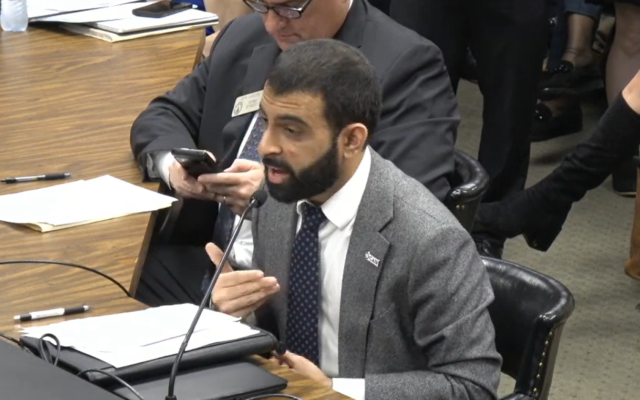
Speaking in opposition to HB 30, Murtaza Khwaja, executive director of CAIR (Council on American Islamic Relations) Georgia, said, “Let’s be very clear: Antisemitism is very real. It’s one of the great evils of this world.” However, he continued, HB 30 conflates criticism of Israel with antisemitism and, as such, risks “denying and infringing on Georgians’ constitutional right to free speech.”
Ilise Cohen, a leader in the Atlanta chapter of Jewish Voice for Peace and a scholar whose focus is Sephardic and Mizrachi Jews, said, “There is not a consensus among Jewish Georgians on the definition of antisemitism, which alone should raise a question.” Linking antisemitism to opposition to Israeli government policies ‘”forces an unfair loyalty to a country that is not my own,” she said.
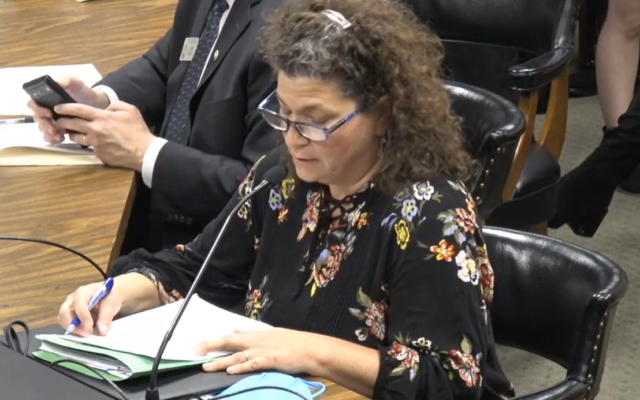
“There is no reason for Georgia to protect one country over the other 195 countries in the world,” Cohen said. “Georgia law should not tell us what we can and can’t say about a foreign country.”
Legislators, meanwhile, discussed whether or not the bill should incorporate the wording of the IHRA definition or whether it is sufficient that the bill only refer to the IHRA definition, as the legislation currently reads. Another issue of concern was IHRA’s own reference to its “non-legally binding working definition of antisemitism.” The phrase “working definition” left some legislators to worry that a future legislature could change the language and thus the definition’s application.
Blairsville Republican Rep. Stan Gunter, chair of the Judiciary Committee, said that his background as a judge made the word “working” problematic. “It reads as a word that could be changed,” Gunter said. “If you don’t put the definition in it, the word ‘working’ opens the door for a judge to interpret this.”
Carson said that the preference of groups supporting the bill was not to include the specific wording of the IHRA definition, so that the language cannot be amended to alter its meaning or intention.
Atlanta Democratic Rep. Stacey Evans, who said that she was prepared to vote in favor of HB 30, cautioned the audience that, in the end, the committee must vote on the language in the bill itself, not on the arguments surrounding the measure.
Atlanta Democratic Rep. Roger Bruce, after expressing uncertainty about passing the bill without including the definition’s wording, moved to table the measure until the questions and concerns raised by committee members could be answered.
- News
- Dave Schechter
- politics
- Georgia House Judiciary Committee
- House Bill 30
- International Holocaust Remembrance Alliance
- Antisemitism
- General Assembly
- First Amendment
- John Carson
- Mark Goldfeder
- National Jewish Advocacy Center
- Hillel
- Samantha Strelzer
- Rollins Student Government Association
- Emory University
- Simone Wilker
- Hadassah
- Murtaza Khwaja
- Council on American-Islamic Relations
- Ilise Cohen
- Jewish Voice for Peace
- Stan Gunter
- Stacey Evans
- Roger Bruce



comments